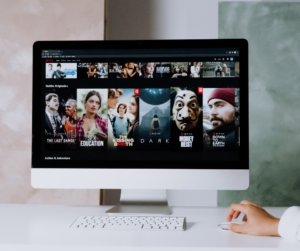┃Reading time: 8 minutes┃
From time immemorial, people have been searching for the Holy Grail of language learning. Looking for shortcuts, hacks, quick fixes, and sometimes pure magic that would help them to immediately download the language into their brain from the global matrix.
Let me not dash your hopes just yet because watching tv/films might not be the outright solution to it all but it might just about help…
It is a controversial method to advance your English because as it usually goes, people find it difficult to agree on whether it is beneficial or not. When struck by such a conundrum, the smartest way to go about it, is to find a balance between opposite forces; the middle way may seem to be the answer.
FRIEND OR FOE?

I once sat through a whole film in the Czech language, I figured that I would be able to understand some of it because I had some phrases up my sleeve, and I had also read the book on which the film was based on. However, to this day I probably remember such an experience as one of the most discouraging moments I have ever survived while trying to learn a language. In short, it made me abandon the idea that I would ever be able to master it.
So what happened?
-
The language level was simply too high to understand what was going on. For language acquisition to occur, the input we receive must be just a bit beyond our current level.
-
Watching is a passive experience. If you observe children when they start learning a language, the ones who interact with others improve much quicker.
-
In some cases, films can be too long and require your undivided attention when they are not in your mother tongue.
-
As it was such a demanding experience, what initially promised to be fun, led me to inevitably shut down.
-
There are no second chances at the cinema.
Then, how can films or series exactly help you?
- From basic to advanced English, it will help you gather the sounds and rhythms of a language.
- When you listen to words or phrases you have come across in textbooks, it will help you consolidate the knowledge (it helps you store it in your long-term memory).

3. Advance your vocabulary by identifying and learning high-frequency words such as ‘mission – words that are immediately recognised as a whole and do not require any decoding. As well as picking up slang which people use in everyday conversations; will make you sound more natural.
4.Understanding cultural cues and idiosyncrasies, which if you are not living an English- speaking country might be completely out of reach.
5. It offers a unique opportunity to be exposed to authentic English which has not been tampered with to adapt it level-wise.
SUBTITLES OR to FREE DIVE WITHOUT THEM?
Once more, we face controversy toward the use of subtitles. Some will argue that they are a crutch because they do not exist in real life, others will claim that it may be seen as a script which enables you to follow a storyline which might otherwise be too difficult to understand.
However, from my years of experience both as a language learner and as a teacher alike, I dare say that both options are valid and useful, yet you would be focusing on different skills at a time.
Subtitles will be of use in order to follow the flow of the film, particularly if the plot has many twists and turns and you are not particularly familiar with the topic. Additionally, you will come across new words as well as expressions and if you do use subtitles, it is less likely that you miss out on relevant information which might stagnate your overall understanding.
You are also allowing yourself to make a connection between the spoken and written word which is prone to be a quite daunting as an English learner. In other words, you are practicing both your listening and reading skills.
On the other hand, being brave enough to free dive into the unknown without a lifesaver can certainly pay off as it will fine tune your ear, not only to different accents but to the rate of (speech) delivery which is about 150 words a minute. Still, this tends to accelerate or slow down as the plot unfolds before you, so it certainly keeps you on your toes. It will also foster getting the gist of it, which means understanding the general idea despite, in this case, not being able to grasp every single word that is uttered.
To my mind, both exercises are a win-win situation.
7 WAYS TO GO ABOUT IT
-
The first premise should always be that you choose something you enjoy, this will allow you to engage. If you find stock markets fascinating or whatever the topic may be, unquestionably go for it and do not think about it twice.
-
If you are to choose a film, pick one you have already seen in your own language as it will simplify the task of having to make heads or tails of what you are watching, and it will let you be more at ease through the process.
-
Do not freak out in the face of adversity, when you realise you have missed one too many words. Manage to solve the puzzle through inferences and deductions which will offer you a view of the forest instead of just the tree.
-
Have a notebook next to you to jot down new words and phrases.
-
Engage with the characters and therefore with the story. If you are part of it, you are more likely to not only understand but get the subtilties of the language such as how intonation can alter the meaning of a phrase.
-
Watch the same film multiple times, till you are able to dissect each line.
-
Use the opportunity to work on your pronunciation, not only your listening skills. Repeat what you hear….
FILMS OR SERIES?
As mentioned previously, a film might be too long, or the topic might be too complex so as to engage you in a gleeful watching experience.
There are certain advantages to series such as the obvious fact that they are shorter. Language-wise it does depend on the topic of the series whether it will be an easy watch or a taxing one. Because the topic remains constant, it enables you to expand your range of vocabulary within a topic as well as offering you plenty of repetition so those words you pick up are stored for good.
The fact that they are significantly shorter than a film can also be attractive to many people who struggle to find time to dedicate to their second language, we all know that 30 minutes is significantly much easier to squeeze in than 2 hours.
So that’s all folks! Find the right balance that works for you and what suits your lifestyle. After all, we are no longer in lockdowns which forced us to binge watch anything we had at hand.
Just remember that…even though, this might teach you culture, language, and pronunciation only if you are ready to put in the work and effort it deserves.
I wonder, what will you watch next?



